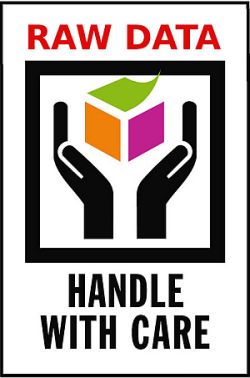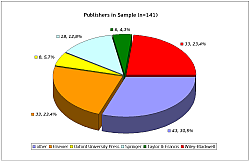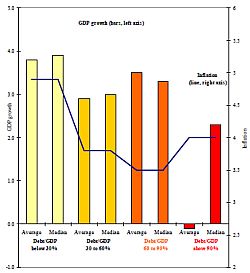Posted: April 16th, 2018 | Author: Sven | Filed under: EDaWaX, journals | Tags: data archives, Data Policies, Linking Data and Publications | Comments Off on New Paper asks: “Do journals journals enforce their data policies?”
 I am happy to announce that our paper “Journals in Economic Sciences: Paying Lip Service to Reproducible Research?” finally has been released.
I am happy to announce that our paper “Journals in Economic Sciences: Paying Lip Service to Reproducible Research?” finally has been released.
The article, published in the latest issue of the IASSIST Quarterly, regards the practice of 37 journals in economics and business administration when it comes to the enforcement of their data policies.
For this purpose, we checked 599 articles which have been published in two issues of these journals. We chose the issues 1/2013 and 1/2014.
First, we estimated the share of articles that fall under a data policy, because replication data is needed to verify the published results. Afterwards, we checked the journal data archives and supplemental information section of each of these articles for the availability of replication files.
For a reduced sub-sample of 245 data-based articles, we checked in depth whether the replication files we found are compliant with the requirements of the journal’s respective data policy. Thereby, we are able to determine how much journals in economic sciences enforce their data policies and to calculate the ‘compliance rate’ for each journal in our sample. Read the rest of this entry »
Posted: April 19th, 2017 | Author: Sven | Filed under: EDaWaX, journals | Tags: data archives, Data Sharing, DOI, Linking Data and Publications | Comments Off on Managing research data using the ZBW Journal Data Archive

Yesterday, a new blog post has been published on ZBW Mediatalk in which I describe the history and the background of the EDaWaX-project that led to the development of the ZBW Journal Data Archive. The Journal Data Archive (JDA) is a service for editorial offices of journals in economics and partially also in the social sciences. Currently this service is free of charge and already two renowned journals are using our services productively.
The JDA offers direct linking between published research papers and the underlying data, that has been used to generate the findings of an article. The workflow is time-saving and easy to handle: Authors of a journal’s article submit their replication files to the system and describe these files with additional metadata. For us it was quite important to find a useful balance between the efforts a user has to invest to generate these additional metadata and the needs of our information systems. For the development of our metadata schema, we followed the motto ‘as much as necessary, as little as possible.’ Read the rest of this entry »
Posted: February 12th, 2016 | Author: Sven | Filed under: found on the net, journals, Research Data | Tags: Linking Data and Publications, publisher | 1 Comment »
 As announced a few days ago, over 400 Elsevier journals will offer direct linking options with datasets in ICPSR. ICPSR, the Inter-university Consortium for Political and Social Research maintains and provides access to a vast archive of social science data – in total more than 500,000 files. It hosts 16 specialized collections of data in education, aging, criminal justice, substance abuse, terrorism and other fields.
As announced a few days ago, over 400 Elsevier journals will offer direct linking options with datasets in ICPSR. ICPSR, the Inter-university Consortium for Political and Social Research maintains and provides access to a vast archive of social science data – in total more than 500,000 files. It hosts 16 specialized collections of data in education, aging, criminal justice, substance abuse, terrorism and other fields.
These datasets become discoverable through corresponding research articles on ScienceDirect, a website operated by the Anglo-Dutch publisher Elsevier. This allows researchers to access underlying research data immediately while reading the research paper, and potentially reuse the data for their own research. Vice versa, research articles on ScienceDirect can also be accessed directly from within the ICPSR datasets providing additional information to place the data into context. An example is available here. Read the rest of this entry »
Posted: June 25th, 2014 | Author: Sven | Filed under: EDaWaX, Projects | Tags: DOI, Linking Data and Publications, persistent identifiers | 1 Comment »
 We are very happy to announce that our research funding organisation, the German Research Foundation (DFG), has granted another two years of funding for our project.
We are very happy to announce that our research funding organisation, the German Research Foundation (DFG), has granted another two years of funding for our project.
In their final report, based on the good results of the project’s first funding phase, the reviewers concluded that EDaWaX’s planning for expanding the pilot application and for undertaking a detailed analysis of journals in business studies should be supported with “high”, respectively “highest priority.” Read the rest of this entry »
Posted: March 18th, 2014 | Author: Sven | Filed under: found on the net | Tags: access to data, Data Sharing, Linking Data and Publications | Comments Off on Mendeley and labfolder join forces to improve data linking and exchange
Mendeley, a desktop and web program for managing and sharing research papers recently announced a collaboration with labfolder – a Berlin-based startup. labfolder is a digital lab notebook which helps scientists to keep their notes and data organized. The linking of these two tools allows the citation and embedding of scientific literature into experimental raw data, and the exporting and sharing of experiment descriptions in Mendeley.
For those interested in labfolder, I embedded the product video below. (Sorry for the advertising. I only mention the collaboration, because it shows that data availability and interlinking data and publications gets increasingly important)
https://www.youtube.com/watch?feature=player_embedded&v=S8OCIBAfbTE
Posted: April 18th, 2013 | Author: Sven | Filed under: found on the net | Tags: Data Sharing, economics, Linking Data and Publications | 1 Comment »
Yesterday several blogs, journals and news agencies spread the news: The US star economists Kenneth Rogoff and Carmen Reinhart are in trouble, because a paper of them -which had and has a considerable influence on worldwide economic policy- contains at least one serious error.
Their paper “Growth in a Time of Debt” was published in the flagship of economic research – the American Economic Review (AER) with also has a data availability policy that was evaluated in the course of our research project.
Important political assumptions and decisions were based on the research of Rogoff and Reinhart: Olli Rehm, European Commissioner for Economic and Monetary Affairs and the Euro and vice president of the European Commission and also the US-Republican Paul Ryan argued with the findings of Rogoff and Reinhart to justify austerity economics. Read the rest of this entry »
Posted: December 10th, 2012 | Author: Sven | Filed under: Data Policy, EDaWaX | Tags: academic publishing, Data Policies, Data Sharing, Linking Data and Publications | 1 Comment »
This article is cross-posted from the blog of the Open Economics Working Group
Background
 In Economics, as in many other research disciplines, there is a continuous increase in the number of papers where authors have collected their own research data or used external datasets. However, so far there have been few effective means of replicating the results of economic research within the framework of the corresponding article, of verifying them and making them available for repurposing or using in the support of the scholarly debate.
In Economics, as in many other research disciplines, there is a continuous increase in the number of papers where authors have collected their own research data or used external datasets. However, so far there have been few effective means of replicating the results of economic research within the framework of the corresponding article, of verifying them and making them available for repurposing or using in the support of the scholarly debate.
In the light of these findings B.D. McCullough pointed out: “Results published in economic journals are accepted at face value and rarely subjected to the independent verification that is the cornerstone of the scientific method. Most results published in economics journals cannot be subjected to verification, even in principle, because authors typically are not required to make their data and code available for verification.” (McCullough/McGeary/Harrison: “Lessons from the JMCB Archive”, 2006)
Harvard Professor Gary King also asked: “[I]f the empirical basis for an article or book cannot be reproduced, of what use to the discipline are its conclusions? What purpose does an article like this serve?” (King: “Replication, Replication” 1995). Therefore, the management of research data should be considered an important aspect of the economic profession.
Read the rest of this entry »
Posted: September 19th, 2012 | Author: Sven | Filed under: Projects | Tags: academic publishing, Data Policies, Data Sharing, Linking Data and Publications | 1 Comment »
 Journal Research Data Policy Bank (JoRD) is a JISC funded initiative conducting a feasibility study into the scope and shape of a sustainable service that will collate and summarise journal policies on Research Data to provide researchers, managers of research data and other stakeholders with an easy source of reference to understand and comply with these policies. Read the rest of this entry »
Journal Research Data Policy Bank (JoRD) is a JISC funded initiative conducting a feasibility study into the scope and shape of a sustainable service that will collate and summarise journal policies on Research Data to provide researchers, managers of research data and other stakeholders with an easy source of reference to understand and comply with these policies. Read the rest of this entry »
Posted: July 3rd, 2012 | Author: Sven | Filed under: Data Sharing | Tags: academic publishing, Datasets, Linking Data and Publications | Comments Off on Thompson Reuters announces Start of „Data Citation Index“
 Thomson Reuters, known for the Social Sciences Citation Index (SSCI) or the Web of Knowledge, has announced to start a “data citation index (DCI).”
Thomson Reuters, known for the Social Sciences Citation Index (SSCI) or the Web of Knowledge, has announced to start a “data citation index (DCI).”
This new index will incorporate content from data sets and data studies deposited in over 80 established, curated repositories, from around the World, multidisciplinary coverage across social sciences, physical sciences, life sciences and arts and humanities. The aim of the DCI is to facilitate the discovery, use and attribution and data studies, and link those data to peer reviewed literature.
Read the rest of this entry »
Posted: April 13th, 2012 | Author: Sven | Filed under: Data Sharing, Research Data | Tags: academic publishing, data publication, Linking Data and Publications, Open Data | Comments Off on Linking and lightening: LabArchives and BioMed Central create a new platform for publishing scientific data
 Sharing and reuse of data has become a vital part of modern scientific research. Having access to datasets ensures that the pace of scientific discovery is not unnecessarily hindered by data being kept under lock and key or hidden away in lab drawers.
Sharing and reuse of data has become a vital part of modern scientific research. Having access to datasets ensures that the pace of scientific discovery is not unnecessarily hindered by data being kept under lock and key or hidden away in lab drawers.
In this context I read some interesting news: As part of the commitment to reproducible research and transparency, BioMed Central has now partnered with LabArchives to work together for the shared goal of making datasets supporting peer-reviewed publications available and permanently linked to online publications – and available under terms which permit reuse freely, as Open Data.
Read the rest of this entry »
Posted: April 2nd, 2012 | Author: Sven | Filed under: EDaWaX | Tags: Data Policies, Linking Data and Publications, scholarlary journals, WP2 | 2 Comments »
 Today I want to share some parts of our current research with you. While writing our report on the work package 2, I thought it would be a good idea to publish some of my thoughts – it helps to structure all the information we have.
Today I want to share some parts of our current research with you. While writing our report on the work package 2, I thought it would be a good idea to publish some of my thoughts – it helps to structure all the information we have.
I start with a brief introduction about the selection of scholarly journals for our research work. Surely this will be only a small excerpt of the whole information presented in the report. So watch out for this publication!
Read the rest of this entry »
Posted: March 23rd, 2012 | Author: Sven | Filed under: journals, Opinion | Tags: academic publishing, access to data, Linking Data and Publications | 1 Comment »
 Already a while ago, in fall 2010 the Journal of Neuroscience announced that it will stop hosting and peer-reviewing supplementary material for articles, so authors are no longer allowed to include any additional materials when they submit new manuscripts. A radical cut and a practice I haven’t heard of yet.
Already a while ago, in fall 2010 the Journal of Neuroscience announced that it will stop hosting and peer-reviewing supplementary material for articles, so authors are no longer allowed to include any additional materials when they submit new manuscripts. A radical cut and a practice I haven’t heard of yet.
Despite the fact that this journal is neither part of our research sample for EDaWaX’s work package 2 nor in the scientific field of Economics it is worth to investigate the motivation for banning the supplements.
And of course it is interesting to notice what the journal proposes to do instead of hosting and peer-reviewing supplementary material. Read the rest of this entry »
Posted: January 2nd, 2012 | Author: Sven | Filed under: Projects | Tags: Linking Data and Publications | 1 Comment »
 In early December 2011 the Open Aire Plus Project was launched – the project is designed to run 30 months and is funded by the EU. The aim of the project is providing cross-links from publications to data and funding schemes.
In early December 2011 the Open Aire Plus Project was launched – the project is designed to run 30 months and is funded by the EU. The aim of the project is providing cross-links from publications to data and funding schemes.
OpenAireplus brings together 41 pan-European partners, including three cross-disciplinary research communities.
The project will build on the efforts of the OpenAIRE Project, that enables Researchers to deposit their research publications that were funded by ERA or FP7 into OA-Repositories.
In the copurse of the project, the current publication repository networks will be expanded to attract data providers from domain specific scientific areas.
Creating a robust, participatory service for the cross-linking of peer-reviewed scientific publications and associated datasets is the principal goal of OpenAIREplus. As scholarly communication touches upon many disciplines, the project’s horizontal outreach will facilitate collaboration across data infrastructures, providing information to scientists, non-scientists as well as to providers of value-added services. The project will establish an e-Infrastructure to harvest, enrich and store the metadata of Open Access scientific datasets. Underlying technical structures will be deployed to support the management of and inter-linking between associated scientific data.
Dr. Norbert Lossau, Scientific Coordinator of the project and Director of Goettingen State and University Library states:
“The participatory design of OpenAIREplus will seamlessly guide the researcher to Open Access research data. The experienced consortium will pave the way to support the research work of European scientists and open up the road to multi-disciplinary science”
Posted: November 29th, 2011 | Author: Sven | Filed under: Projects | Tags: Linking Data and Publications | Comments Off on GESIS: Integration of Research Data and Literature in the Social Sciences
 Today I want to introduce another project of the 27 projects that are funded by the German Research Foundation (DFG) in a call on “Information Infrastructure for Research Data”.
Today I want to introduce another project of the 27 projects that are funded by the German Research Foundation (DFG) in a call on “Information Infrastructure for Research Data”.
This project is InFoLiS (Integration von Forschungsdaten und Literatur in den Sozialwissenschaften / Integration of Research Data and Literature in the Social Sciences) – managed by GESIS, the Leibniz Institute for the Social Sciences.
Intensifying the interconnectedness between digital information systems and their respective data sources is a major issue in the digital era and constitutes an important demand for the supply of scientific information. Missing links between resources require scientists conducting empirical research to manually search full texts of publications for references to the underlying data sources. These references are not cited in a standardized manner. Information about the referenced data sources can only be accessed using separate and structurally distinct information systems. This procedure is not only time consuming, but the inconsistency and sometimes incompleteness of citations may also hamper or even impede data retrieval. Because of this, linking metadata of publications and studies and making them accessible directly via joint information systems constitutes an important task.
GESIS and the Mannheim University Library aim to achieve this objective in the InFoLiS project. Study data administered by GESIS shall be linked to publication data provided by Mannheim University Library in order to extend and professionalize existing information systems. In the course of this project, various methods will be investigated and integrated into the involved systems. On this basis, the project will evaluate and recommend different approaches for data integration and thereby ensure the usability of the results for other universities and institutes engaging in Social Sciences.
 I am happy to announce that our paper “Journals in Economic Sciences: Paying Lip Service to Reproducible Research?” finally has been released.
I am happy to announce that our paper “Journals in Economic Sciences: Paying Lip Service to Reproducible Research?” finally has been released.

 As announced a few days ago, over 400 Elsevier journals will offer direct linking options with datasets in
As announced a few days ago, over 400 Elsevier journals will offer direct linking options with datasets in  We are very happy to announce that our research funding organisation, the German Research Foundation (
We are very happy to announce that our research funding organisation, the German Research Foundation (
 In Economics, as in many other research disciplines, there is a continuous increase in the number of papers where authors have collected their own research data or used external datasets. However, so far there have been few effective means of replicating the results of economic research within the framework of the corresponding article, of verifying them and making them available for repurposing or using in the support of the scholarly debate.
In Economics, as in many other research disciplines, there is a continuous increase in the number of papers where authors have collected their own research data or used external datasets. However, so far there have been few effective means of replicating the results of economic research within the framework of the corresponding article, of verifying them and making them available for repurposing or using in the support of the scholarly debate.
 Sharing and reuse of data has become a vital part of modern scientific research. Having access to datasets ensures that the pace of scientific discovery is not unnecessarily hindered by data being kept under lock and key or hidden away in lab drawers.
Sharing and reuse of data has become a vital part of modern scientific research. Having access to datasets ensures that the pace of scientific discovery is not unnecessarily hindered by data being kept under lock and key or hidden away in lab drawers.
 In early December 2011 the Open Aire Plus Project was launched – the project is designed to run 30 months and is funded by the EU. The aim of the project is providing cross-links from publications to data and funding schemes.
In early December 2011 the Open Aire Plus Project was launched – the project is designed to run 30 months and is funded by the EU. The aim of the project is providing cross-links from publications to data and funding schemes.






